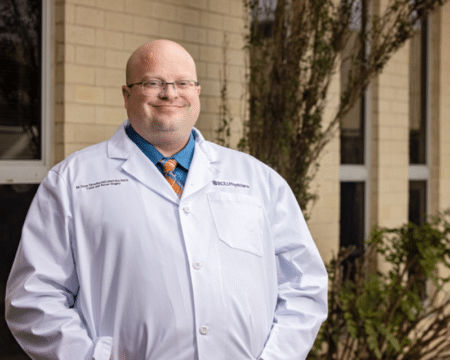Recently, the guidelines for when someone should begin having screenings for colorectal cancer have been updated, and it is now recommended people at average risk for colorectal cancer begin screenings at age 45. The American Cancer Society lowered the age to start screening from 50 because studies show rates of colorectal cancer among people younger than 50 are on the rise and expected to almost double by 2030. Screenings starting at age 45 could help save more lives.
For people of average risk and no family history of colorectal cancer, the first screenings establish a baseline and depending upon the results, will determine the recommended time for the next screening. Regular screenings should continue for people who are in good health through the age of 75.
For people at higher risk for colorectal cancer, there may be reason to start screening before age 45. They may also need to be screened more often or get specific tests. Dr. Drew Honaker, colorectal surgeon & clinical assistant professor, Brody School of Medicine, ECU/Vidant Health, said, “Factors that put those with higher risk include having a strong family history of colorectal cancer or certain types of polyps. Another factor of family history that should be taken into consideration is the presence of a hereditary syndrome such as familial adenomatous polyposis (FAP) or Lynch syndrome.”
It is recommended that people ages 76 through 85 should decide with their health care provider whether to continue to get screened. Factors that should be considered include their personal preferences, prior screening results, overall health and life expectancy. People beyond the age of 85 should no longer be screened for colorectal cancer.
Someone’s personal history may determine an earlier need for colorectal cancer screening. If a person has inflammatory bowel disease, such as ulcerative colitis or Crohn’s disease, if certain types of polyps are present or if there is a history of radiation to the abdomen or pelvis to treat a prior cancer, these conditions will put someone at higher risk.
People who think or know they are at higher risk for colorectal cancer should talk to their health care provider, who can help choose the best screening option and schedule. There are several test options for colorectal cancer which include stool-based screenings and visual exams. Though an invasive procedure, a colonoscopy is the most thorough procedure for preventing colorectal cancer.
In terms of proactive, preventative practices, there are steps you can take to reduce your risk for colorectal cancer. It’s important to maintain a healthy diet that is low in red and processed meats and high in fruits, vegetables and whole-grain fiber. A balance between a healthy diet and lifestyle includes:
- a diet low in red and processed meats and high in fruits, vegetables and whole-grain fiber
- physical activity to help maintain a healthy body weight
- limiting alcohol and tobacco use. Quitting smoking should be a top priority for helping prevent colon cancer and if alcohol is consumed, it should be in moderation
Even if you take all of these steps to reduce your risk of colorectal cancer, you cannot eliminate the risk entirely. That’s why everyone 45 or older should talk to their medical provider, choose a screening test, and get screened routinely.
For more information about the risks, prevention and screening resources for colorectal cancer, or if you do not have a primary care provider, please contact the Prevention Clinic at ECU Health Cancer Care (252) 816-RISK (7475).
